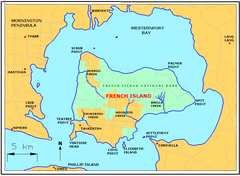French Island (Victoria)
French Island is a large island in Western Port, Victoria, Australia. It is 61 km southeast of Melbourne. In 1997 about 70 per cent of the island was made the French Island National Park. It has also been listed as part of the National Estate. In 2002, the waters on the north coast were made into the French Island Marine National Park.

Even though it is close to Melbourne, French Island is relatively isolated and undeveloped. There is no water or electricity supply, or medical services on the island. There is one small shop and post office on Tankerton Road about 3 km from Tankerton Jetty. There is a number of places to stay, including camping, bed and breakfasts, guest houses, and the McLeod Eco Farm which was once a prison.
History
changeAn Australian aboriginal clan, Bunarong Tribe lived and hunted on French Island.[1] The first Europeans to discover the island were the French in April 1802. A group from the ship, La Naturaliste, explored the area naming it Île de Françoise, (French Island).[2] In 1847 the first settlers, William and John Gardner, started farming on the island. In the 1880's, koalas were released on to the island. In the 1890's the government set up several small villages. Farmers began to grow chicory, and about 30 chicory kilns were built.
On July 17, 1916 the McLeod Prison Farm opened and continued until 1975.[2] In 1967, the State Electricity Commission (SEC)wanted to build the first nuclear power plant in Australia on French Island
Tankerton Post Office opened on 3 September 1890 and closed in 1994. It reopened in 2001 under the name French Island. A Fairhaven office was also open from 1911 until 1957.[3]
Nuclear power plant site
changeIn 1967, the SEC told the Lands Department to keep 400 acres of French Island for future construction of a nuclear power plant. The plant, to be built in the 1970's, would generate 350-500MW of electricity. More nuclear power plants would be built in Australia once there was a successful, fully operational plant in Victoria. The SEC also planned to build more brown coal power stations as well.[4]
Due to the low cost of brown coal in Victoria and pressure from the anti-nuclear movement, the SEC decided not to build a nuclear plant and instead continued to build brown coal plants. These included the Hazelwood Power Station, which was completed in 1971. Nuclear plants were not built in New South Wales, as access to black coal allowed for bigger generators. The declaration of various areas of many Australian states as nuclear free zones was a key factor in the selection of coal plants over nuclear plants.
Access
changeThere is easy access to the island by train and ferry. People can take a train from Melbourne to Frankston. From Frankston there is a diesel locomotive service to Stony Point. It is a short walk along the jetty to catch the passenger ferry to Tankerton jetty on French Island. It is also possible to catch a passenger ferry from Cowes on Phillip Island.
Geography
changeImportant features are Mount Wellington which is 96m in height and the Pinnacles at 66m.
People
changeIn 2006 there were 89 people living on French Island.[5] In 2009,there were five students at the primary school.[6]
Natural Environment
changeHabitats range from coastal mangroves, swamps, heath, grasslands and blue gum forests. Most koalas on the mainland of Australia suffer from the chlamydia disease. French Island provides the world's most dense and disease free group of koalas. They are often moved to repopulate diseased areas on the mainland. Shelter is provided for more than 100 species of bush orchids, and 260 species of birds. Significant species on the island include: King Quail, the critically endangered Orange-bellied Parrot, Fairy Tern, White-bellied Sea Eagle, Swamp Skink, Long-nosed Potoroo. The island is one of only two places in Victoria where there are no foxes. Because of this, the island has kept a variety of native species which have been devastated by the fox in other areas. However rabbits, feral cats, feral goats, feral pigs, Indian Mynahs and starlings pose a threat to the island's biodiversity.
Transport
changeAs the only cars used on the island are by residents, the network of more than 40 km of gravel roads and tracks are quiet and ideal for cycling. The island is generally flat or mildly undulating with the highest point being Mt Wellington (96 m). Bicycles can be hired from the General Store, Macleod Eco Farm and Bayview. There are many walking tracks. Other activities include bushwalking, bird watching, horse riding, cycling, and as a base for deep sea fishing.
Two local tour companies, French Island Tours and French Island Eco Tours, can provide bus tours of the island.
Camping
changeThere is one free camping site in the National Park at Fairhaven, 4 km up the coast road from Tankerton Jetty, where the ferry arrives from Stony Point. The camp site is set among trees near the beach, with one public toilet and a water tank. Other camping is available at "private sites" at Bayview and McLeod Eco Farm by arrangement.
References
change- ↑ "About French Island". French Island Community Association. Retrieved 22 February 2016.
- ↑ 2.0 2.1 "Parks Victoria: French Island National Park page". parkweb.vic.gov.au. Archived from the original on 31 January 2005. Retrieved 27 July 2010.
- ↑ Premier Postal History, Post Office List, retrieved 2008-04-11
- ↑ "Our N-Power, The Age, October 1967". Archived from the original on 2009-10-01. Retrieved 2009-10-28.
- ↑ Australian Bureau of Statistics (25 October 2007). "French Island (Statistical Local Area)". 2006 Census QuickStats. Retrieved 2008-10-08.
- ↑ "Primary School Class Sizes". The Age. 2003-04-28. Archived from the original on 2008-12-02. Retrieved 2008-10-09.
Other websites
change- French Island Community Association
- French Island Ferry Service
- National Park page at Parks Victoria Archived 2005-01-31 at the Wayback Machine
- French Island Eco Tours Archived 2005-03-07 at the Wayback Machine